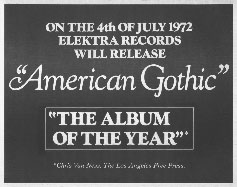![]()
  |

American Gothic
David Ackles
Elektra 75032
Released: July 1972
Chart Peak: #167
Weeks Charted: 10
 The title refers of course to the famous Grant Wood painting; so does the cover art. It has been over two years since we've heard from David Ackles, but American Gothic is well worth the wait. The album bears repeated listening in order for its full impact to be felt. Ackles is an important artist whose work eludes categorization. It has almost no relation to rock & roll and a lot more to do with musical theater. American Gothic is an 11-piece song cycle organized around that "look for America" theme -- in this case, the rediscovery of self through contemplation of vanishing rural America. The musical materials of the album are brilliantly eclectic and ordered with such formal precision as to warrant concert hall production of the song cycle just as it is on record. Chief among the many influences on Ackles' music are Kurt Weill and Aaron Copeland, who for Ackles respectively represent brazen actuality and mythic search. As a singer Ackles stands midway between folk and musical comedy. Since his vocal equipment is modest and his singing style very straightforward he often employs a modified speech-song to dramatize his lyrics. To some it may sound corny, but for me it works since the impulse to melodrama is pretty much held in check.
The title refers of course to the famous Grant Wood painting; so does the cover art. It has been over two years since we've heard from David Ackles, but American Gothic is well worth the wait. The album bears repeated listening in order for its full impact to be felt. Ackles is an important artist whose work eludes categorization. It has almost no relation to rock & roll and a lot more to do with musical theater. American Gothic is an 11-piece song cycle organized around that "look for America" theme -- in this case, the rediscovery of self through contemplation of vanishing rural America. The musical materials of the album are brilliantly eclectic and ordered with such formal precision as to warrant concert hall production of the song cycle just as it is on record. Chief among the many influences on Ackles' music are Kurt Weill and Aaron Copeland, who for Ackles respectively represent brazen actuality and mythic search. As a singer Ackles stands midway between folk and musical comedy. Since his vocal equipment is modest and his singing style very straightforward he often employs a modified speech-song to dramatize his lyrics. To some it may sound corny, but for me it works since the impulse to melodrama is pretty much held in check.
 Click image for larger view. |
American Gothic completely overshadows Ackles' first two albums, both of which contain many fine things. Bernie Taupin is producer. The arrangements, whose excellence cannot be overstated, are all by Ackles. American Gothic is an impressive and original record that deserves a wide audience.
- Stephen Holden, Rolling Stone, 9/14/72.
Bonus Reviews!
Singer-actor David Ackles has himself a big album, more important than it is good, but good enough. Drawing on a staggering variety of sources, he has written a group of songs that practically recount the entire white experience in pop music. The influence of the musical theater in strong in several of the tunes, and the ten-minute "Montana Song" recalls the techniques of Gershwin and the flavor of Copland. There's even a hillbilly sacred number -- "Family Band" -- which I hope is a joke. And more: some uncategorizable stuff such as "Oh, California!," an ecology song for singer and full orchestra with a wry humor, the title song, and "Blues for Billy Whitecloud," which tap Ackles' storytelling ability, and even -- in "Another Friday Night" -- a better-than-average "working-class hero" song.
There are mistakes, of course. The recording lacks vitality, probably because it incorporates black influences only on a second- or third-hand basis: "Montana Song" is essentially pompous; "Oh, California!" invokes too much Tom Lehrer-style cuteness, and the arrangements -- all by Ackles -- are just slightly overblown. I'm particularly bothered by a domineering piano. But the songs are extraordinary. "Love's Enough" and "One Night Stand" are genuinely beautiful love songs, both simple but quite different from one another. "Waiting for the Moving Van," telling the story of another middle-class marriage gone down the drain, has some exceptionally subtle melodic passages. And the allegorical "Ballad of the Ship of State" sets a high mark for protest songs. Ackles' vocals sound something like a cross between Rusty Draper and Richard Burton. If that seems like a horror to contemplate, don't contemplate it until you've heard it. It works. The album is almost as good as its songs -- and that's very good indeed.
- Noel Coppage, Stereo Review, 10/72.
Neither folk nor rock, David Ackles' music is magic. A treasure chest of ideas and emotions, Gothic unites the feelings of American folk and Broadway show music in order to form a breathtaking mixture of mirth and melancholy. David writes about people. His songs range from simple piano pieces to fully orchestrated pop operettas. As everyday life has its many phases, so do Ackles' songs. Mixing tinges of jazz and stretches of brilliantly poignant narrative in with his people-music, Ackles has created a milestone in pop and a study in excellence.
- Ed Naha, Circus, 9-72.
"I won't get maudlin," Ackles promises midway into the second side, locking himself inside the barn as the dappled stallion gallops to join his brothers and sisters on the open range with his mane flying free in the breeze. C-
- Robert Christgau, Christgau's Record Guide, 1981.
The years have only been kind to the album considered David Ackles's masterpiece when it was released. Ackles combined an early '70s singer-songwriter sensibility with a theater music background that placed him as much in the tradition of Brecht-Weill and Jacques Brel as Bob Dylan. Not only are his songs fully realized, dramatic statements, but Ackles proves himself a warm, accomplished singer. When this album got no higher than #167 on the charts, Ackles's fans were heartbroken. Decades later, American Gothic remains one of those great albums that never found its audience. It waits to be rediscovered. * * * *
Further reading on Super Seventies RockSite!: |
David Ackles had been involved in show business since early childhood, when he starred in a number of B-movies. By the late 1960s, however, he was writing songs of stunning beauty and Elektra signed him, initially just as a songwriter. After proving his worth at the company, he was awarded a five-album contract.
His third offering, American Gothic, still remains a largely unrecognized work of genius, one of the most unfashionable and uncompromising American albums ever. Ackles paints a colorful and poetic portrait of America, a hauntingly dark piece of theater filtered through a composer's melodic sensibility. Crafted layer upon layer, it reveals itself more as a dramatic work than a conventional rock or pop release, drawing on modern American classical composers such as Charles Ives and Aaron Copland as well as gospel, rock, blues, and soul. Imagine an art-folk album that bridges Woody Guthrie's passionate storytelling and Kurt Weill's orchestrations.
The title track is a sad story depicting an everyday American drama. "Oh, California!" is a jazzy and bohemian vaudeville song that features Ackles' raucous vocals and might easily have served as an inspirational model for such artists as Tom Waits or even Frank Zappa. The album's distinctive sound owes much to Ackles' collaboration with producer Bernie Taupin, Elton John's long-term creative partner.
It did not even reach the U.S. Top 150 at the time of release. But this distinctive, uncategorizable album fully warrants seeking out.
- George Durbalau, 1001 Albums You Must Hear Before You Die, 2005.
![]() Reader's Comments
Reader's Comments
No comments so far, be the first to comment.
